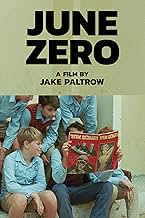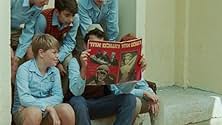A film that examines Adolf Eichmann's trial, capturing the empathy and humanism amidst the atrocities committed during WWII.A film that examines Adolf Eichmann's trial, capturing the empathy and humanism amidst the atrocities committed during WWII.A film that examines Adolf Eichmann's trial, capturing the empathy and humanism amidst the atrocities committed during WWII.
- Awards
- 2 nominations total
- Director
- Writers
- All cast & crew
- Production, box office & more at IMDbPro
Featured reviews
8Nozz
Early on in this movie, the State of Israel is facing the question of how to keep Adolf Eichmann's grave from becoming a neo-Nazi pilgrimage site. It's one of a number of issues that come up regarding shouldering the past versus getting rid of the past. The filmmaker weaves them into a strong coming-of-age story, with a somewhat unconventional boy protagonist and a somewhat unconventional mentor, but when not all the aspects of his message fit in, he doesn't hesitate to insert an entirely different story, with a lengthy monologue recalling a wartime experience, into the middle of the movie. Good for him.
Many Israelis will see the punch line of the monologue coming from a mile away, but the movie, although its in Hebrew, is American-made and there's history to be crammed in that Americans may not know. Sometimes the dialogue gets a little too expository, but not often.
Another flaw, at least to my inexpert eye, is that sometimes the camera expects us to understand something that's not very easy to discern. There's one series of close-ups, while Eichmann is sleeping, where I couldn't figure out what was being photographed at all. And the moment when the reason for the movie's title was revealed went by too fast visually. And there is a sequence during Eichmann's haircut that I think maybe I was supposed to understand as being imagined by one of the characters, but everything was too quick and I'm not sure.
As often happens when American moviemakers, with their deep pockets, put out a call for Israeli actors, big names show up to take even small parts. They all acquit themselves well, and Rotem Keinan, the red-headed actor who makes a career out of playing unsuccessful men, receives an extra credit at the end of the movie as acting coach for the juvenile lead. In that, he was obviously successful.
Many Israelis will see the punch line of the monologue coming from a mile away, but the movie, although its in Hebrew, is American-made and there's history to be crammed in that Americans may not know. Sometimes the dialogue gets a little too expository, but not often.
Another flaw, at least to my inexpert eye, is that sometimes the camera expects us to understand something that's not very easy to discern. There's one series of close-ups, while Eichmann is sleeping, where I couldn't figure out what was being photographed at all. And the moment when the reason for the movie's title was revealed went by too fast visually. And there is a sequence during Eichmann's haircut that I think maybe I was supposed to understand as being imagined by one of the characters, but everything was too quick and I'm not sure.
As often happens when American moviemakers, with their deep pockets, put out a call for Israeli actors, big names show up to take even small parts. They all acquit themselves well, and Rotem Keinan, the red-headed actor who makes a career out of playing unsuccessful men, receives an extra credit at the end of the movie as acting coach for the juvenile lead. In that, he was obviously successful.
By weaving several fictional story lines around an event every well-infortmed person of that time remembers, a cross-section of that moment is suspended in time. Although it is fiction, it rings true and is highly authentic where it needs to be. It is quite true to the Israel of that day.
This approach succeeds where previous films about Eichmann have failed. When he has been portrayed by the likes of Ben Kingsley, Robert Duvall and Thomas Kretschmann, the story has gotten falsified by making Eichmann too interesting. In 1960, Eichmann was kidnapped in Buenos Aires by the Mossad, and put on trial in Israel as shown. People were mostly impressed with Eichmann's unimpressiveness. The leading account is Hannah Arendt's EICHMANN IN JERUSALEM. He came off as a plain, inarticulate, incongruously normal little man. The phrase, "banality of evil" came to stand for it. That phrase has been widely misunderstood as encapsulating some profound, counterinuitive insight about the Holocaust. It does not. It is merely an observation specific to Eichmann.
It has mostly been forgotten that the Mossad mission was intended to capture Eichmann and Dr. Josef Mengele together. But Mengele dropped out of sight, to surface later in Brazil. He was never brought to justice. He drowned accidentally off a gorgeous Brazilian beach while vacationing in 1979. Because he exhibited essential elements that Eichmann lacked--perversion of a privileged, cultured upbringing as well as science and medicine--he ought to have been the man on trial in the glass booth. Had that succeeded, we would have heard far less about "banality of evil" down through the years.
This approach succeeds where previous films about Eichmann have failed. When he has been portrayed by the likes of Ben Kingsley, Robert Duvall and Thomas Kretschmann, the story has gotten falsified by making Eichmann too interesting. In 1960, Eichmann was kidnapped in Buenos Aires by the Mossad, and put on trial in Israel as shown. People were mostly impressed with Eichmann's unimpressiveness. The leading account is Hannah Arendt's EICHMANN IN JERUSALEM. He came off as a plain, inarticulate, incongruously normal little man. The phrase, "banality of evil" came to stand for it. That phrase has been widely misunderstood as encapsulating some profound, counterinuitive insight about the Holocaust. It does not. It is merely an observation specific to Eichmann.
It has mostly been forgotten that the Mossad mission was intended to capture Eichmann and Dr. Josef Mengele together. But Mengele dropped out of sight, to surface later in Brazil. He was never brought to justice. He drowned accidentally off a gorgeous Brazilian beach while vacationing in 1979. Because he exhibited essential elements that Eichmann lacked--perversion of a privileged, cultured upbringing as well as science and medicine--he ought to have been the man on trial in the glass booth. Had that succeeded, we would have heard far less about "banality of evil" down through the years.
- How long is June Zero?Powered by Alexa
Details
- Release date
- Countries of origin
- Languages
- Also known as
- June 0
- Filming locations
- Ukraine(ghetto scenes)
- Production companies
- See more company credits at IMDbPro
Box office
- Gross US & Canada
- $29,856
- Opening weekend US & Canada
- $7,117
- Jun 30, 2024
- Gross worldwide
- $29,856
- Runtime1 hour 45 minutes
- Color
Contribute to this page
Suggest an edit or add missing content






























